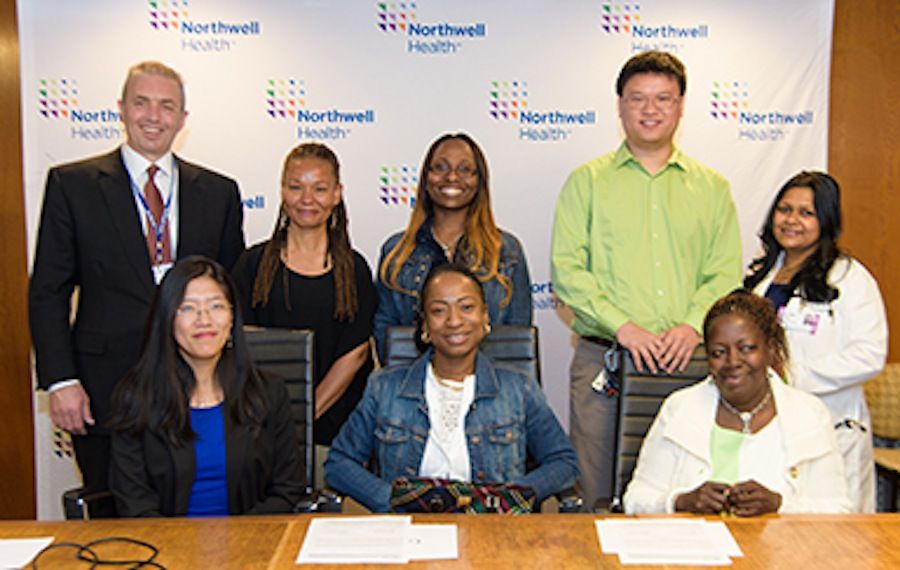An aunt’s determination to save her niece set off a kidney donation chain at North Shore University hospital that ended up saving the lives of two other people, hospital officials said last Thursday.
The three patients and their families were brought together for the first time at a press conference held by the hospital on Thursday.
“This was a long process,” said Nicole Ali, director of the Manhasset hospital’s transplant center. “The first transplant was on October 12, 2015 and the last was on February 2016. It took a lot nurses and social workers and everyone has to come together.”
The chain of donations began in 2014 when Nicole Johnson, a Brooklyn resident, was diagnosed with an acute kidney failure and told she needed a kidney transplant to survive.
Her aunt, Dawn Bates, agreed to donate one of her kidneys to Johnson but doctors determined they weren’t compatible.
“A young lady came into the office and she couldn’t give to her niece,” Ali said. “But she wanted to give to someone who was compatible with her.”
Ali said Bates hoped that by donating her kidney to someone else, the “good karma” would then be returned in kind.
“But we told her there was no guarantee that her nephew was going to get an organ donation from someone else,” Ali said.
Ali said that was because Northwell has a policy about organ donation that restricts contact between organ donors and recipients.
What Bates’ action did do, however, was prompt the team at North Shore University to look through the donor list at the hospital to see who could donate to Johnson, her niece, Ali said.
Bates turned out to be a match with Tiffany Kung, 31 of Westbury.
Buy Kung was already a recipient from her husband Fung Ching, 31, a math teacher in Brooklyn.
To close the chain, Ching would have to be convinced to give his kidney to someone else.
He said it was a “no-brainer.”
“I had already made the decision to save one life. Why not save more?” Ching said.
Kung, Ching’s wife, received Bates’ kidney and Ching donated his to another patient, Elaine Richards, who had been waiting four years for a compatible organ..
Richards, 59 of Uniondale, along with Melvin, her deceased son, was diagnosed with polycystic kidneys in 2012.
Melvin, 38, received a kidney donation in 2013, but died due to a heart attack.
“The dialysis had taken such a toll on him,” his widow, Catherine Richards, 39 said.
“I didn’t want the same thing to happen to my mother-in-law. I wanted to do whatever I could to make sure that she could live her life,” Richards said.
Ernesto Molmenti, surgical director of the North Shore University Hospital Transplant Center, credited Bates with setting off the chain of events that led to three successful kidney transplants.
“She certainly did take a leap of faith and pushed us to dig deeper and wasn’t able to find husband and wife pair,” Molmenti said. “It was certainly Dawn’s idea and every recipient has to agree and Tiffany and Terry and was able to split up.”
Although the six knew they were participating in an exchange, they didn’t know each other personally until Thursday morning, Ali said.
“Tiffany and Dawn met two months after the surgery,” Ali said. “This sort of a bridged chain and everyone didn’t go into the O.R. at the same time at anytime someone could back out.”
There are over 100,000 people in the United States waiting for a kidney transplant, Ali said.
“More than half of these people are on dialysis and many of them will not survive for long because we have such a (organ donation) deficit that people die every,” she said.
Ali said she encourages everyone to consider donating an organ.
“This demonstrates that even if you think you’re not eligible to donate, you can be wrong,” Ali said. “We do a very a thorough work and we make sure that donors are able to live on that one kidney alone.”



